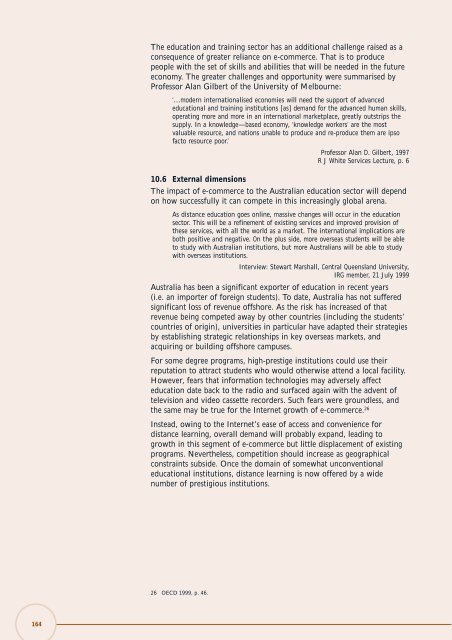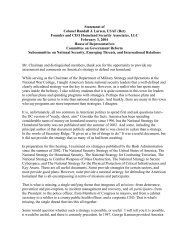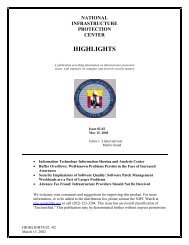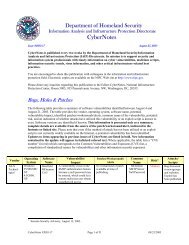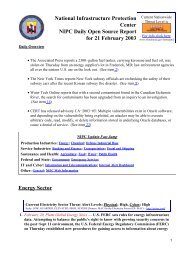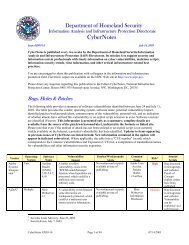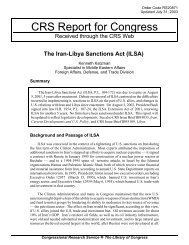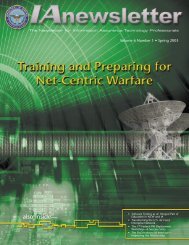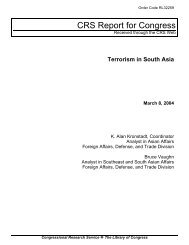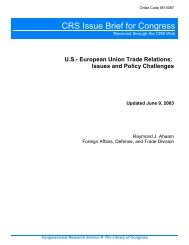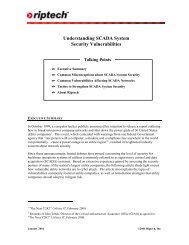beyond pt 0 23/1
beyond pt 0 23/1
beyond pt 0 23/1
Create successful ePaper yourself
Turn your PDF publications into a flip-book with our unique Google optimized e-Paper software.
The education and training sector has an additional challenge raised as a<br />
consequence of greater reliance on e-commerce. That is to produce<br />
people with the set of skills and abilities that will be needed in the future<br />
economy. The greater challenges and opportunity were summarised by<br />
Professor Alan Gilbert of the University of Melbourne:<br />
‘…modern internationalised economies will need the support of advanced<br />
educational and training institutions [as] demand for the advanced human skills,<br />
operating more and more in an international marketplace, greatly outstrips the<br />
supply. In a knowledge—based economy, ‘knowledge workers’ are the most<br />
valuable resource, and nations unable to produce and re-produce them are ipso<br />
facto resource poor.’<br />
Professor Alan D. Gilbert, 1997<br />
R J White Services Lecture, p. 6<br />
10.6 External dimensions<br />
The impact of e-commerce to the Australian education sector will depend<br />
on how successfully it can compete in this increasingly global arena.<br />
As distance education goes online, massive changes will occur in the education<br />
sector. This will be a refinement of existing services and improved provision of<br />
these services, with all the world as a market. The international implications are<br />
both positive and negative. On the plus side, more overseas students will be able<br />
to study with Australian institutions, but more Australians will be able to study<br />
with overseas institutions.<br />
Interview: Stewart Marshall, Central Queensland University,<br />
IRG member, 21 July 1999<br />
Australia has been a significant exporter of education in recent years<br />
(i.e. an importer of foreign students). To date, Australia has not suffered<br />
significant loss of revenue offshore. As the risk has increased of that<br />
revenue being competed away by other countries (including the students’<br />
countries of origin), universities in particular have ada<strong>pt</strong>ed their strategies<br />
by establishing strategic relationships in key overseas markets, and<br />
acquiring or building offshore campuses.<br />
For some degree programs, high-prestige institutions could use their<br />
reputation to attract students who would otherwise attend a local facility.<br />
However, fears that information technologies may adversely affect<br />
education date back to the radio and surfaced again with the advent of<br />
television and video cassette recorders. Such fears were groundless, and<br />
the same may be true for the Internet growth of e-commerce. 26<br />
Instead, owing to the Internet’s ease of access and convenience for<br />
distance learning, overall demand will probably expand, leading to<br />
growth in this segment of e-commerce but little displacement of existing<br />
programs. Nevertheless, competition should increase as geographical<br />
constraints subside. Once the domain of somewhat unconventional<br />
educational institutions, distance learning is now offered by a wide<br />
number of prestigious institutions.<br />
26 OECD 1999, p. 46.<br />
164


